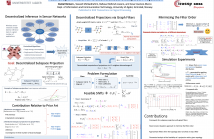
A number of inference problems with sensor networks involve projecting a
measured signal onto a given subspace. In existing decentralized
approaches, sensors communicate with their local neighbors to obtain a
sequence of iterates that asymptotically converges to the desired
projection. In contrast, the present paper develops methods that
produce these projections in a finite and approximately minimal number
of iterations. Building upon tools from graph signal processing, the
problem is cast as the design of a graph filter which, in turn, is
- Categories:
 33 Views
33 Views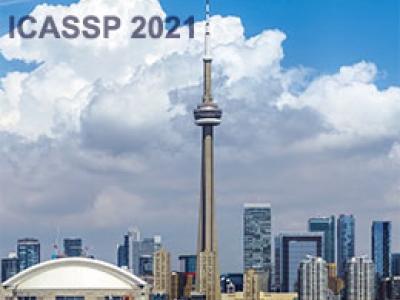
- Read more about Robust graph-filter identification with graph-denoising regularization
- Log in to post comments
When approaching graph signal processing tasks, graphs are usually assumed to be perfectly known. However, in many practical applications, the observed (inferred) network is prone to perturbations which, if ignored, will hinder performance. Tailored to those setups, this paper presents a robust formulation for the problem of graph-filter identification from input-output observations. Different from existing works, our approach consists in addressing the robust identification by formulating a joint graph denoising and graph-filter identification problem.
- Categories:
 34 Views
34 Views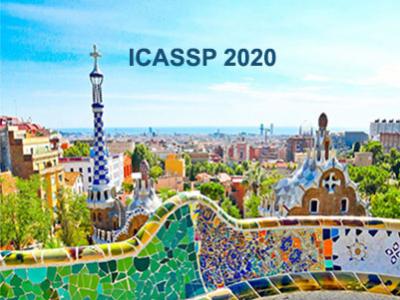
- Read more about Estimating Centrality Blindly from Low-pass Filtered Graph Signals
- Log in to post comments
This work considers blind methods for centrality estimation from graph signals. We model graph signals as the outcome of an unknown
low-pass graph filter excited with influences governed by a sparse sub-graph. This model is compatible with a number of data
generation process on graphs, including stock data and opinion dynamics. Based on the said graph signal model, we first prove that the
- Categories:
 24 Views
24 Views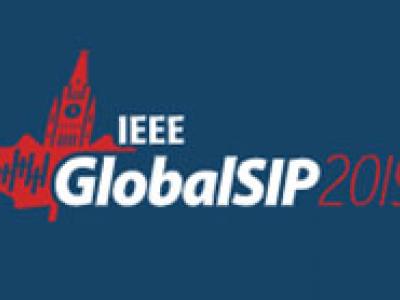
- Read more about Bayesian Design of Sampling Set for Bandlimited Graph Signals
- Log in to post comments
The design of sampling set (DoS) for bandlimited graph signals (GS) has been extensively studied in recent years, but few of them
poster_xx.pdf
- Categories:
 36 Views
36 Views
- Read more about Aggregation Graph Neural Networks
- Log in to post comments
Graph neural networks (GNNs) regularize classical neural networks by exploiting the underlying irregular structure supporting graph data, extending its application to broader data domains. The aggregation GNN presented here is a novel GNN that exploits the fact that the data collected at a single node by means of successive local exchanges with neighbors exhibits a regular structure. Thus, regular convolution and regular pooling yield an appropriately regularized GNN.
- Categories:
 43 Views
43 Views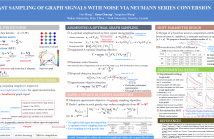
- Read more about Fast Sampling of Graph Signals with Noise via Neumann Series Conversion
- Log in to post comments
Graph sampling with independent noise towards minimum mean square error (MMSE)
leads to the known A-optimality criterion, which is computation-intensive to
evaluate and NP-hard to optimize. In this paper, we propose a new low complexity
sampling strategy based on Neumann series that circumvents large matrix
inversion and eigen-decomposition. We first prove that a DC-shifted A-optimality
criterion is equivalent to an objective computed using the inverse of a
sub-matrix of an ideal graph low-pass (LP) filter. The LP filter matrix can be
- Categories:
 40 Views
40 Views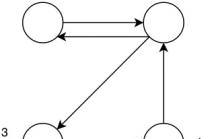
In this paper, we discuss the problem of modeling a graph signal on a directed graph when observing only partially the graph signal. The graph signal is recovered using a learned graph filter. The novelty is to use the random walk operator associated to an ergodic random walk on the graph, so as to define and learn a graph filter, expressed as a polynomial of this operator. Through the study of different cases, we show the efficiency of the signal modeling using the random walk operator compared to existing methods using the adjacency matrix or ignoring the directions in the graph.
- Categories:
 34 Views
34 Views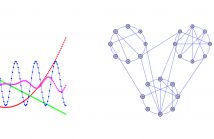
- Read more about Analysis vs Synthesis - An Investigation of (Co)sparse Signal Models on Graphs
- Log in to post comments
- Categories:
 44 Views
44 Views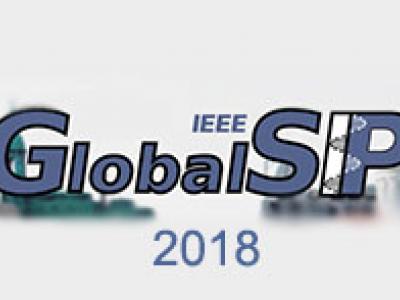
Power outages have a major impact on economic development due to the dependence of (virtually all) productive sectors on electric power. Thus, many resources within the scientific and engineering communities have been employed to improve the efficiency and reliability of power grids. In particular, we consider the problem of predicting power outages based on the current weather conditions. Weather measurements taken by a sensor network naturally fit within the graph signal processing framework since the measurements are related by the relative position of the sensors.
- Categories:
 65 Views
65 Views
- Read more about Analysis vs Synthesis - An Investigation of (Co)sparse Signal Models on Graphs
- Log in to post comments
- Categories:
 23 Views
23 Views